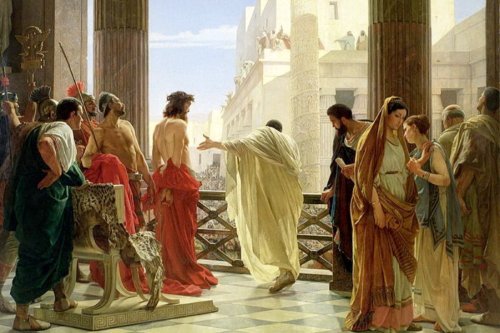
by Antonio Ciseri (1821–1891)/Wikipedia/Public Domain
Most of us are familiar with the Pontius Pilate’s role in the crucifixion of Christ. After Christ had been brought before him, Pilate concluded that Jesus was not guilty of the charges brought by the chief priests and officers (John 19:6), and was prepared to let Christ go.
As was a tradition, on the eve of Passover, Pilate offered to release a prisoner and in this instance chose Christ. But when the crowd, stirred up by the Jewish priests, shouted for Barabbas to be released, Matthew writes that Pilate, fearing a riot, washed his hands of the trial and ordered Christ’s crucifixion (Matthew 27:24-26).
Christ’s crucifixion would have taken place sometime between 26/27 AD and 36/37 AD when Pilate served as governor.
The bad blood between Pilate and the Jews
Several things had happened early during Pilate’s governorship that made him nervous about the Jews who had gathered to demand Christ’s crucifixion.
According to Josephus (Antiquities of the Jews), Pilate had put up Roman standards across Jerusalem. This was part of the Imperial cult, which considered the emperors to be gods.
This so outraged the Jews that they actually gathered outside Pilate’s palace to protest the standards for five nights in a row.
There is even a hint, that Pilate knew this would anger the Jews because he ordered the standards installed at night.
These protests and other incidents resulted in Pilate removing the standards.
Josephus adds that Pilate also took money from the Jewish temple treasury and used it to build an aqueduct.
Pilate also manufactured coins. Though they did not have images of the Roman emperor on them, their pagan designs would have annoyed the Jews.
So with this pre-existing bad blood, some suspect Pilate agreed to execute Christ to not provoke any more trouble and perhaps to even get on the good side of the chief priests.
What happened to Pilate after the execution of Christ?
So what happened to Pilate after Christ’s crucifixion?
Josephus (Antiquities of the Jews) writes that Pilate fell into disfavor with Rome after he massacred several Samaritans who had gathered to search for gold near Mount Gerizim. They believed valuable artifacts had been buried there by Moses.
Believing the Samaritans were instigating a rebellion, Pilate sent in the Roman army, who slaughtered the largely unarmed men.
Angered, the Samaritans complained and Emperor Tiberius, who had appointed Pilate, removed him as governor and ordered Pilate to come to Rome and face a tribunal.
However, while on the journey to Rome, Tiberius died and was replaced by Caligula, and at this point, all news about Pilate ends.
With the new emperor in place, we have no idea if Pilate was even forced to appear before a Tribunal. However, we do know he was not reappointed as Roman governor.
Church historian, Eusebius, who was writing in the fourth century, provides another tidbit of information on the demise of Pilate. He states in his book, Church History, that Pilate was so humiliated on losing his governorship, he committed suicide, perhaps even on the orders of Caligula, in 39 AD.
Since Eusebius provided no source for this information, other than tradition, some have questioned the accuracy of this statement. However, Wikipedia adds that others such as Daniel Schwartz believe that Eusebius’ claim “should not lightly be dismissed.”
Some argue that the Gospel writers portrayed Pilate in a somewhat sympathetic light and, according to Britannica, the early church looked upon Pilate positively.
However, the opinions about Pilate changed over time, and most Christians today do not look upon him favorably.
Even so, the Ethiopian Church still considers Pilate and his wife as saints and honors them with a feast day on June 25.
The Eastern Orthodox Church also commemorates Pilate’s wife, who is called St. Claudia Procula, on October 27. This is based on the dream that Pilate’s unnamed wife had about Jesus, warning her husband that Christ was an innocent man (Matthew 27:19).
